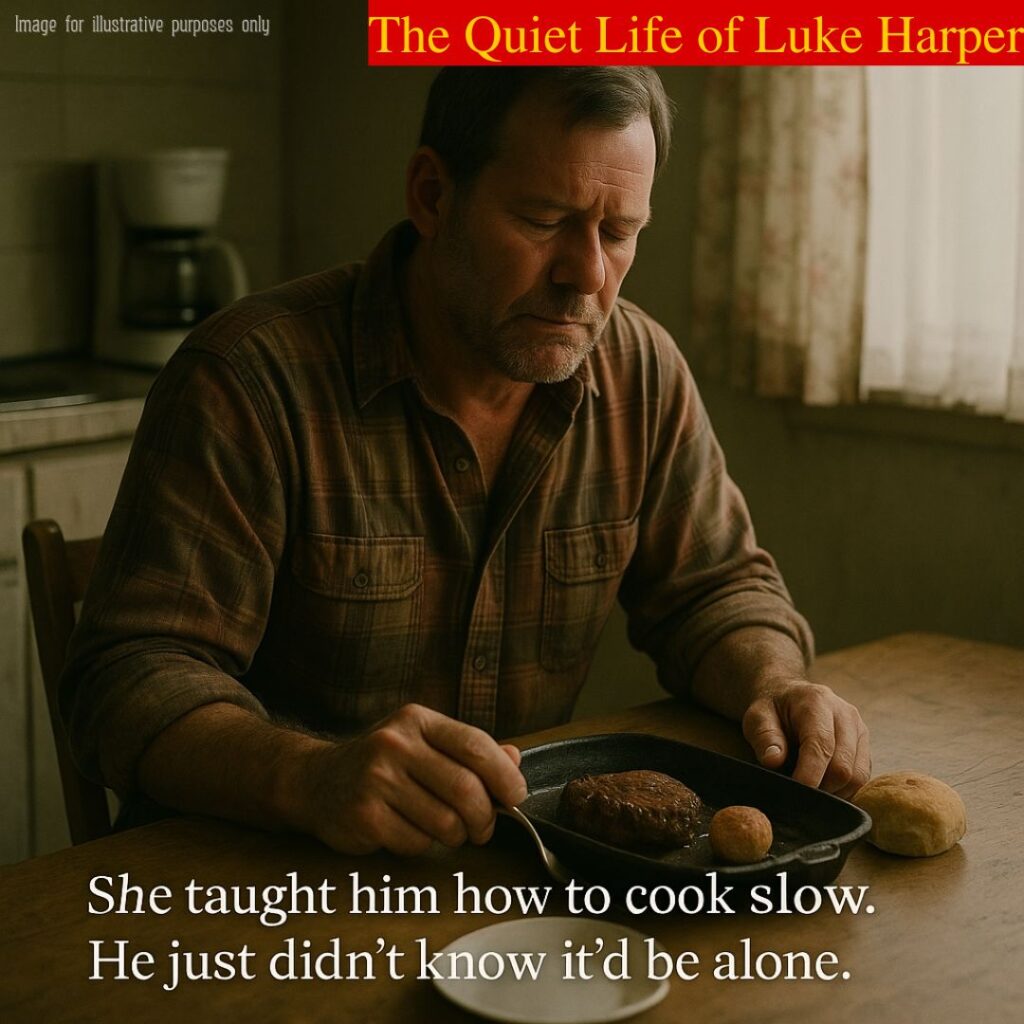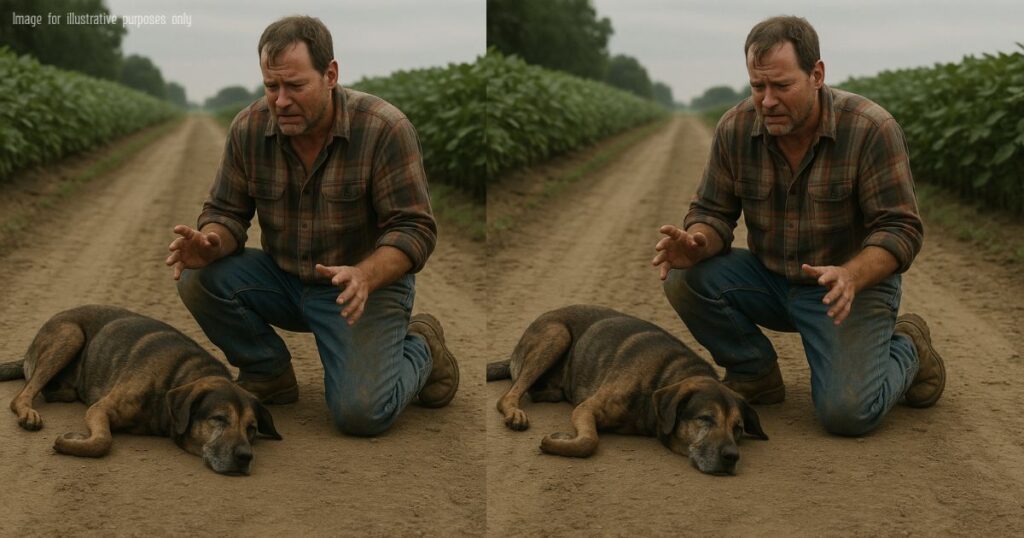Part 2 – “The Last Sunday Dinner”

“The day Mama stopped cooking, the house got quieter than it had any right to.”
I was seventeen the first time I noticed my mother’s hands shaking.
She stood at the kitchen sink, sleeves rolled up, scrubbing rust off Daddy’s coffee pot like the world would end if she didn’t get it spotless. Her wrists jerked in little circles, just enough for the sunlight to catch the tremor. She never said anything. Mama never made a fuss about herself.
But something about that motion, that quiet trembling, stuck with me like a thorn you don’t pull out.
Mama cooked every Sunday. Didn’t matter if we were flat broke or flush with a good harvest. She made a roast with carrots, mashed potatoes heavy with butter, cornbread so soft it collapsed in your mouth. Sometimes she even pulled out the chipped blue plates from Grandma’s hope chest. Only on Sundays.
Daddy said grace loud, like God was hard of hearing. My little sister, Ruthie, always reached for the rolls before “Amen.” And I’d watch Mama, always the last to sit, wiping her hands on her apron, eyes scanning the table like she was counting her blessings by face.
That table could’ve fed ten, but it was always just the four of us. Five if you count Hank, once he came into our lives years later.
That Sunday in October—the last Sunday dinner—I was 41.
Mama was 83, but still walking around like the Lord owed her one more decade.
Ruthie had flown in from Tulsa with her two kids, plastic-wrapped pies from the grocery store, and a tired smile that didn’t quite reach her eyes. She hadn’t been home in nearly three years.
And me? I showed up in a shirt that didn’t smell like diesel for once, and boots I’d actually wiped clean. Hank limped behind me, stiff but determined, like the soldier he’d always been.
The table looked smaller somehow. The room darker.
Maybe it was the bulb flickering over the sink, or the way Mama’s skin looked thin as tracing paper now. Her eyes still sharp, though. Sharp enough to catch mine when I tried to take the carving knife.
“Sit,” she said. Just that one word.
So I did.
She carved the roast with both hands like always, though the knife wobbled once or twice. Ruthie said something about getting her one of those electric slicers. Mama pretended not to hear.
The meal started quiet.
Then Ruthie asked if I’d thought about selling the farm.
The words hung in the air like spoiled milk.
I didn’t answer. Just cut my roast into pieces I didn’t feel like eating.
Ruthie kept going, soft and reasonable. Said she’d looked up a “cash buyer” who’d take it all—land, house, barn—for a good price. Said I could retire, maybe move to Springfield. Said “it’s too much for one man.”
I told her I wasn’t just one man.
I was soil and sweat and fence wire and stories buried under fence posts no one else remembered.
Mama didn’t say a word. She kept chewing, slow and steady, like nothing was happening.
Later, after the pie and the fake smiles and the hugs that felt more like handshakes, Ruthie left.
The grandkids waved. Hank barked once at the truck tires and then turned away, tail low.
I stayed to help Mama clean up, though she waved me off. Said it was “her kitchen” and I had “fields to worry about.”
She handed me a Tupperware of leftovers. Roast, carrots, a single roll.
“You still eat too fast,” she said. “Warm this slow. Sit down when you eat it.”
Then she kissed my cheek.
And for the first time in my life, I felt how small her lips were. How cold.
Mama died three weeks later. In her sleep.
Ruthie flew back, cried loud, and made the arrangements.
The preacher said she was “a quiet woman with a loud kind of love.” Said she fed people when they didn’t ask, prayed for folks who never knew it.
I stood beside the casket and didn’t say a word.
Afterward, Ruthie packed boxes like she was late for something. Said I could keep what I wanted. Said the rest would go to Goodwill.
I asked for one thing: the Sunday roast pan.
Blackened edges, handle half-melted, bottom warped from decades of heat.
Ruthie looked at me like I was asking for a ghost.
But she gave it to me.
That winter was dry. Dust in the barn, dust on the windowsills, dust in the air like the world was forgetting how to rain.
I didn’t cook much. Just canned beans, fried eggs, toast if the bread was still good.
One Sunday, mid-January, I pulled out the roast pan.
Hank was gone by then. Shot by men who thought land could be bought with signatures.
The house was too quiet. Like someone had turned the volume down on life itself.
I rubbed oil in the pan. Peeled potatoes. Salted the meat with fingers that had touched too many grave markers.
It smelled like her, almost.
I ate alone at the table. Just me, one fork, and a mug of weak coffee.
The roast was overcooked. Potatoes too soft. Roll dry.
Didn’t matter.
I ate slow.
Like she told me.
And I swear—somewhere in that silence—I heard her say grace.
Not loud. Not even real.
But I heard it.
And I answered with the only thing I had left: a tear that landed square in the middle of that blackened roast pan.
Some dinners feed your stomach. Others feed your soul.
The last one Mama cooked fed me long after she was gone.
And every time I pull out that warped old pan, I remember:
Food spoils. Farms break. Dogs die. Mothers fade.
But the love?
The love cooks slow.
And it stays warm.
Even in an empty house.


